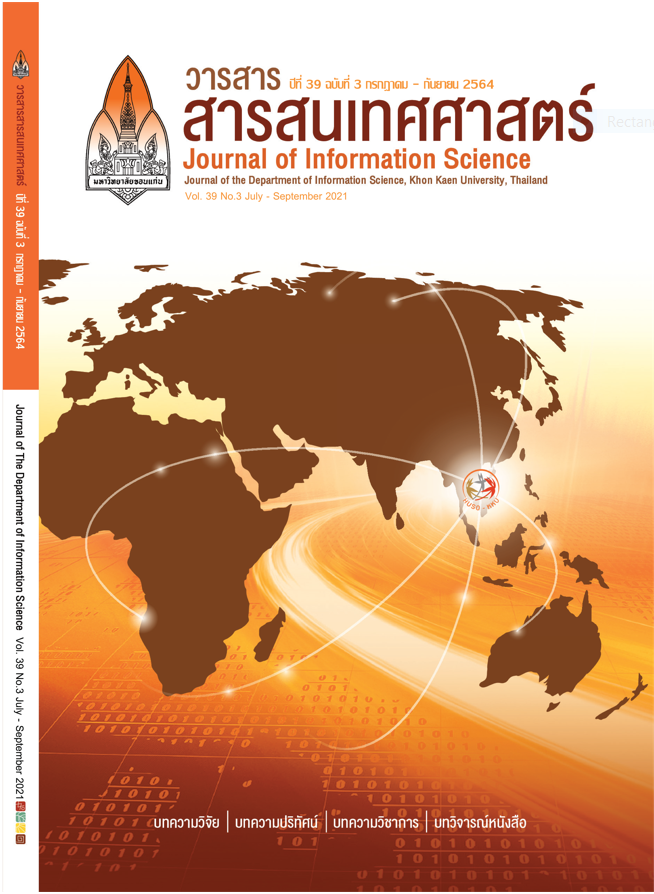Digital Resilience of Children towards Cyberbullying and Online Hate Speech: Comparative Study of Educational Environment in Chiang Mai and Songkhla School
DOI:
https://doi.org/10.14456/jiskku.2021.20Keywords:
Cyberbullying, Online Hate speech, Digital Media, Digital Resilience, Digital LiteracyAbstract
Purpose of the study: This comparative study examines the forms and factors of self-adjustment and preparation to encounter with cyberbullying and online hate speech of the elementary school students in Chiang Mai and Songkhla provinces.
Methodology: The investigation was conducted with Prathom 4 to 6 of the elementary schools in Chiang Mai and Sonkhla provinces from December 2019 to December 2020 using the learning units on cyberbullying and online hate speech prevention, open-ended and close-ended questions, semi-structured interviews, group discussions with the students, teachers and parents, participative observation, and After Action Review (AAR).
Main findings: The analysis of the data reviews that the primary school children in Chiang Mai gain more experiences in cyberbullying than those in Songkhla. This is related to the media accessibility. The schools provide supportive factors to prepare the students to enable to digitally adjust themselves to encounter the cyberbullying and online hate speech. In addition, good relationships between students and teachers, teachers and parents, especially the collectivism value collaboration in the Thai context integrated with student learning center concept become positive factors for building digital resilience.
Applications of the study: This research should lead to the development of guidelines for students’ preparation and adjustment to digital resilience for the benefits of their leaning at the young age and their coping with cyberbullying and online hate speech.
Downloads
References
Buckingham, D. (2000). After the death of childhood. Cambridge: Polity Press.
Field, D.C. (2006). Cyber Bulling and Victimization: Psychosocial Characteristics of Bullies,Victims, and Bully/Victims. Thesis for Master of Arts, the University of Montana.
Graafland, J. H. (2018). New technologies and 21st century children: Recent trends and outcomes. Retrieved by 2 April 2021, from https://www.oecd- ilibrary.org/content/paper/e071a505-en
Hu, Q., et al. (2018). Individualism-collectivism orientations and coping styles of cyberbullying victims in Chinese culture. Current Psychology, 37(1), 65-72.
Kaewseenual, S. (2018). Risky opportunities: developing children’s resilience through digital literacy in Thailand. Ph.D. thesis in Screen & Media Studies, The University of Waikato.
Kaewseenual, S. and Thampanya U. (2020). Digital resiliency: the vision of transforming educational policy to enhance digital literacy for Thai children. Journal of Mass Communication, 8(1), 75-99.
Kaewseenual, S., Thampanya, U., & Chittakuttanon, L. (2020). Childhood ideologies reflected through digital literacy learning. PAYAP UNIVERSITY JOURNAL, 30(2), 31-47.
Kowalski R. M. (2009). Cyber Bullying. Unpublished manuscript.
Laeheem, K. & Baka, D. (2011). The risk factors are related to Thai Muslim youth’s aggressive behavior in the three southern border provinces of Thailand. NIDA Development Journal, 51(3), 59-90.
Livingstone, S. (2013). Online risk, harm and vulnerability: Reflections on the evidence base for child Internet safety policy. ZER: Journal of Communication Studies, 18(35), 13-28.
Livingstone, S., Mascheroni, G., & Staksrud, E. (2015). Developing a framework for researchingchildren’s online risks and opportunities in Europe. Retrieved July 18, 2020, from shorturl.asia/LDHrc
Llorent, V. J., Ortega-Ruiz, R., & Zych, I. (2016). Bullying and cyberbullying in minorities: Are they more vulnerable than the majority group?. Frontiers in psychology, 7, 1507.
Olweus, D., & Limber, S. P. (2018). Some problems with cyberbullying research. Current opinion in psychology, 19, 139-143.
Papatraianou, L.H., Levine, D., & West, D. (2014). Resilience in the face of cyberbullying: An ecological perspective on young people’s experiences of online adversity. Pastoral Care in Education, 32(4), 264-283.
Park, M. S. A., Golden, K. J., Vizcaino-Vickers, S., Jidong, D., & Raj, S. (2021). Sociocultural values, attitudes and risk factors associated with adolescent cyberbullying in East Asia: A systematic review. Cyberpsychology: Journal of Psychosocial Research on Cyberspace, 15(1), 1-19.
Pokpong, S. & Musikphan, W. (2010). Factors affecting attitudes and behaviors physical violence and cyberbullying among Thai youths. Mahidol University.
Redmond, P., et al. (2018). Pre-service teachers' perspectives of cyberbullying. Computers & Education, 119, 1-13.
Rodríguez-Hidalgo, A. J., et al. (2018). Psychological predictors of cyberbullying according to ethnic-cultural origin in adolescents: a national study in Spain. Journal of cross- cultural psychology, 49(10), 1506-1522.
Samoh, N., Boonmongkon, P., Ojanen, T., Samakkeekarom, R., Guadamuz, T. (2013). Youth perceptions on cyberbullying. Journal of Behavioral Science for Development, 6(1), 351-364.
Sittichai, R. (2014). Information technology behavior cyberbullying in Thailand: incidence and predictors of victimization and cyber-victimization. Asian Social Science, 10(11), 132-139.
Sittichai, Ruthaychonnee & Smith, P.K. (2013). bullying and cyberbullying in Thailand: a review. International Journal of Cyber Society and Education, 6(1), June, 31-44.
Staksrud, E. (2016). Children in the online world: risk, regulation, rights. New York, USA, Routledge.
Staksrud, E., Ólafsson, K & Livingstone, S. (2013). Does the use of social networking sites increase children’s risk of harm?. Computers in human behavior, 29(1), 40-50.
The Wisdom Society for Public Opinion Research of Thailand. (2009). Cyber-bullying behavior of Thai youths in Bangkok. National Institute for Child and Family Development, Mahidol University.
Tudkuea, T & Laeheem, K. (2014). development of indicators of cyberbullying among youths in Songkhla province. Asian Social Science, 10(14), 74-79.
Tudkuea, T. & M. Sabaiying (2017). Patterns, effects and coping with cyber bullying among students of a college in the southern part of Thailand. Journal of Behavioral Science for Development (JBSD), 9(2), 221.
Tudkuea, T., Laeheem, K. & Sittichai, R. (2019). A development of cyber bullying behavioral indicators for youth in Songkhla Province. Master thesis Ph.D. thesis of Art in Human and Social Development, Prince of Songkla University.
Vandoninck, S., d'Haenens, L., & Roe, K. (2013). Online risks: Coping strategies of less resilient children and teenagers across Europe. Journal of children and media, 7(1), 60-78.








